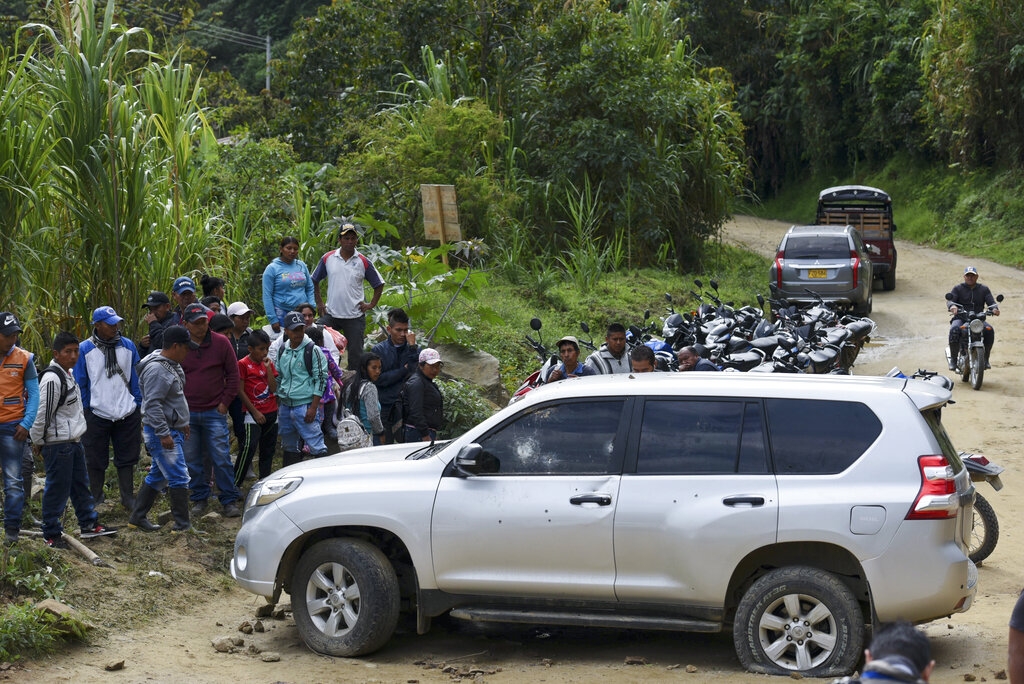Slaying of 5 indigenous leaders shocks Colombians

President Ivan Duque will deploy 2,500 troops to a conflict-ridden zone in Colombia's southwest to reinforce security after a band of renegade rebels allegedly killed five indigenous leaders.
The five people from the Tacueyo reservation were killed late Tuesday when their caravan of armored SUVs was ambushed by gunmen the government says belong to a faction of Revolutionary Armed Forces of Colombia that refused to accept the larger rebel group's peace treaty with the government.
Among those killed was Cristina Bautista, the top authority and spiritual leader of the semi-autonomous reservation in southwestern Colombia. Six other people were injured as the gunmen continued to fire at an ambulance tending to the injured.
Duque immediately condemned the "assassination" and traveled to the area Wednesday to oversee operations aimed at hunting down the assailants. He said in the next 40 days some 2,500 troops would arrive to the zone.
"The state is here to take decisions," Duque, flanked by his top military advisers, said at the conclusion of a meeting with community leaders.
But his expressions of solidarity barely registered with indigenous leaders, who have repeatedly condemned the government for standing by as a "genocide" takes place in communities caught in the crossfire of Colombia's decades-long conflict between leftist rebels, right-wing paramilitaries and state security forces.
Dozens of indigenous and social leaders have been killed in the aftermath of Colombia's historic 2016 peace accord as illegal armed groups and dissidents seek to exert control over for former rebel territory and lucrative drug routes. Among those killed were 14 members of tribes in Cauca state, where Tuesday's massacre took place. It is one of Colombia's fastest-growing areas for cocaine production, responsible for about 10% of all illegal crops produced across the country last year, according to the United Nations.
"When will the massacre end?" the National Indigenous Organization of Colombia lamented on Twitter as news of the attack spread.
An initial investigation suggested the massacre came in retaliation for the capture of three members of a residual FARC front by members of the indigenous guard unit, community leaders who mete out justice in their territories. Killed alongside Batista were four members of the indigenous guard.
Reflecting a pacifist philosophy, guard members don't carry firearms, asserting their authority instead with a wooden staff adorned with the multicolored ribbons representing their tribe.
"Our only weapon is our unity and spirituality," said Luis Acosta, national coordinator of the indigenous guards.
The armed groups "don't allow us to control our territories because we reject the logic of war," Acosta said from the desolate roadway where community members gathered Wednesday to inspect the bullet-riddled vehicle and urge more protection from Duque.
"This is a historical battle for territory," said Sen. Feliciano Valencia, who represents Colombia's indigenous community in Congress. "While the armed groups fight for control of illicit crops and drug routes, we are defending our territory and autonomy."
The nearly 2 million Colombians belonging to 115 indigenous groups carry less political and economic weight than their brethren in neighboring countries like Ecuador or Peru and are largely relegated to poverty-stricken areas traditionally neglected by the state and where alternatives to growing illicit crops are hard to come by.
